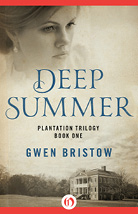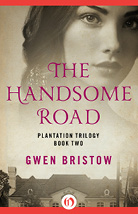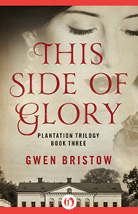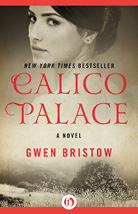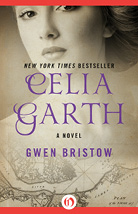Tomorrow Is Forever (28 page)
Read Tomorrow Is Forever Online
Authors: Gwen Bristow

She took back the novel, over Cherry's protests, and made Brian bring in a book on water-culture of plants he had left outside to catch the dew. “Nobody will ever explain these things to us the way Mr. Kessler did,” Brian said regretfully. “He was just about to help us build a tank. Gosh, it's a shame about him.”
She agreed, and went to Margaret's room. Ready for bed, Margaret was waiting for Elizabeth to come tuck her in. “Will you keep something for me?” she asked.
Elizabeth said she would. Opening a box she had brought from her earlier home, Margaret gave her a silver fountain pen.
“It belonged to my fatherâMr. Kessler, I mean,” she explained. “The boss gave it to him for Christmas. It's such a pretty pen, and he used it a lot. But we mostly write with pencils at school. Will you take care of it?”
Elizabeth picked up the pen. Its polished surface gave back a bright reflection of the bedside light.
“Why yes, Margaret, I'll keep it for you,” she promised. “Then when you're older and want a pen for your writing, I'll give it back to you.”
Margaret got into bed, and Elizabeth opened the window.
“It's getting colder,” Margaret observed.
“There's still snow on the mountains. The boss says he can see it when he drives home through the canyon.”
She kissed Margaret good night, and took up the pen again. It occurred to her that if there was still any ink in it, the barrel should be emptied before it was put away. She unscrewed the cap.
The reflection of the light made a bright clear line along the side of the pen. As she removed the cap and exposed the lower end, Elizabeth saw that just above the point, the line of light halted in a blur.
Laying the cap on the table, she took out her handkerchief. The smudge on the silver surface appeared to be a light one, and she held the pen nearer her eyes to see if it could be rubbed off with the corner of the handkerchief or if the silver would require polishing before it was put away. Holding the pen at the upper end, she turned it to catch the light at the edges of the dull spot, and saw that what had appeared at first to be a formless blur was actually the strong clear print of a thumb.
Something caught sharply in Elizabeth's chest. She was sure it was a thumb, because the print lay diagonally on the holder, just above the inner edge of the pen-point; whoever had last used this pen had been a writer accustomed to hold it as low down as possible, his fingers sharply bent. As clearly as if it were a recollection from yesterday she could remember herself saying, “Arthur, doesn't it give you a cramp in your hand, holding a pen as close to the point as that?”
Her heart was pounding so hard that she had difficulty in keeping her voice level as she asked,
“Margaret, has anybody used this pen sinceâsince you came to live here?”
There seemed a breathless space between her question and Margaret's answer, though actually Margaret answered without hesitation. “No, why? Is there something the matter with it?”
“Oh no,” said Elizabeth. “I was just wondering.”
“Father carried it in his pocket,” Margaret added. “He liked it very much. Nobody ever used it but him.”
“I see,” said Elizabeth.
Her hands, holding the pen in the right and her handkerchief in the left, were trembling, and so numb that she could hardly feel what she was holding. She tried to pick up the cap from the table, dropped it, and stooped to recover it.
“Good night, dear,” she said, still bent so Margaret could not see her face. “I'll put this away for you.”
“All right. Good night, Elizabeth.”
Still holding the pen carefully by the upper tip, Elizabeth put out the light with her free hand and went out, closing the door behind her. Standing in the hall outside, she waited, taking deep slow breaths to make her heart be quiet. When her hands were steadying she lifted the pen again, and watched the reflection of the hall light on the lines and ridges of the print. Suddenly, almost to her own surprise, she brushed it with her lips, a swift light kiss like the one she had given Kessler the last time she had seen him. Then, quickly, before she could be tempted any more, she began to polish the pen with her handkerchief, rubbing hard. After a moment she held up the pen to the light and turned it around. The reflection along the polished silver was unbroken.
The pounding in her chest was gone too. Her hands were no longer trembling and no longer numb. She felt a vast inexpressible sense of triumph.
Taking the pen into her bathroom, she let out the ink and filled the barrel with water two or three times to clean it. When it was dry she replaced the cap and put the pen away in a drawer of her desk to wait until Margaret should have need of it. As she closed the drawer she laughed, softly and proudly.
“Now I have conquered,” she said in a low voice.
From his own room next door, Spratt called to her. “What are you doing, Elizabeth?”
“Putting away a fountain pen that belonged to Mr. Kessler, the one you gave him last Christmas. Margaret asked me to keep it till she was old enough to use it at school.”
“Oh, I see. I'm glad she still has it.”
Elizabeth smiled, a happy little secret smile. You never did tell everything. Not everything. She never would tell Spratt she had rubbed out that thumb-print because she had believed it would assure her that Kessler and Arthur were the same, and she did not want to be sure. It was enough for her to know that in rubbing it out she had rubbed Arthur out of her life, and left herself and Spratt free to go forward into the future together with no shadow of yesterday between them.
Spratt called, “Do you want to come in here and listen to the news? It goes on in five minutes.”
“Why yes,” Elizabeth answered. “I'll be right in.” From outside she heard the wind, blowing down from the mountains where there were still ridges of winter snow. “I'll be there in a minute, Spratt,” she called. “But first I'd better get you an extra blanket It's going to be a chilly night.”
She brought the blanket from the hall closet. “Thanks,” Spratt said when she entered. He grinned at her appreciatively. “You think of everything, don't you?”
“I like taking care of my family,” said Elizabeth. She came to sit on the arm of his chair. As Spratt leaned back to look up at her she bent over impulsively and kissed him. He slipped his arm around her waist, and she rested against him while they listened to the voice of the radio announcer and the sound of the wind as it rushed down from the snow on the mountains.
About the Author
G
wen Bristow (1903â1980), the author of seven bestselling historical novels that bring to life momentous events in American history, such as the siege of Charleston during the American Revolution (
Celia Garth
) and the great California gold rush (
Calico Palace
), was born in South Carolina, where the Bristow family had settled in the seventeenth century. After graduating from Judson College in Alabama and attending the Columbia School of JournalismÂ, Bristow worked as a reporter for New Orleans'
Times-Picayune
from 1925 to 1934. Through her husband, screenwriter Bruce Manning, she developed an interest in longer forms of writingânovels and screenplays.
After Bristow moved to Hollywood, her literary career took off with the publication of
Deep Summer
, the first novel in a trilogy of Louisiana-set historical novels, which also includes
The Handsome Road
and
This Side of Glory
. Bristow continued to write about the American South and explored the settling of the American West in her bestselling novels
Jubilee Trail
, which was made into a film in 1954, and in her only work of nonfiction,
Golden Dreams
. Her novel
Tomorrow Is Forever
also became a film, starring Claudette Colbert, Orson Welles, and Natalie Wood, in 1946.
All rights reserved, including without limitation the right to reproduce this ebook or any portion thereof in any form or by any means, whether electronic or mechanical, now known or hereinafter invented, without the express written permission of the publisher.
This is a work of fiction. Names, characters, places, events, and incidents either are the product of the author's imagination or are used fictitiously. Any resemblance to actual persons, living or dead, businesses, companies, events, or locales is entirely coincidental.
Copyright © 1943 by Gwen Bristow
Copyright renewed © 1971 by Gene Bristow
Cover design by Connie Gabbert
ISBN 978-1-4804-8518-1
This edition published in 2014 by Open Road Integrated Media, Inc.
345 Hudson Street
New York, NY 10014
www.openroadmedia.com

FROM OPEN ROAD MEDIA
